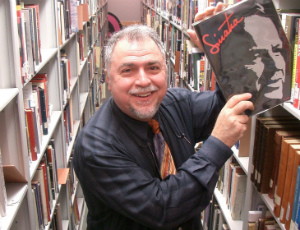Librarian Christopher Popa will perform Frank Sinatra's hits at The Sinatra Centennial on December 14 at Harold Washington Library Center. The event celebrates the 100th anniversary of Sinatra's birth, so we chatted with Christopher about Ol' Blue Eyes and his importance in musical history.
Q. Why do you think Frank Sinatra was so popular?
A. Frank Sinatra became an entertainment legend because he was unique, achieved great success and did many different things very well. First and most prominently, as a singer he performed so many timeless hits during his career, which stretched nearly seven decades, from the mid-1930s to the mid-1990s, and he sold more than 150 million records total worldwide. He went from being a vocalist with the big bands of trumpeter Harry James and trombonist Tommy Dorsey to a solo singing star who eventually conquered all entertainment media—radio, recordings, films, TV and the concert stage.
Q. What makes Frank Sinatra special to you?
A. He had a great singing voice and did fantastic songs, sometimes with a very swinging arrangement and other times employing a very beautiful one. He evolved the crooner style of singing that had started with people like Rudy Vallee and Bing Crosby, then took it a step further. Instead of a megaphone like Vallee used, he had the microphone and could cozy up to it to sing softly and intimately. Frank Sinatra really sang from the heart. He never formally learned how to read music; however, he had a natural understanding of it. Even if he didn’t sing with, say, the trained voice or projection of an operatic singer, his voice touches people with tremendous sincerity and humanity, as if he’s singing directly to each of us. On top of that, he worked with many talented musicians, including the arranger Nelson Riddle, who likened the perfect tempo of a song for Frank Sinatra to the human heartbeat.
Q. What is your favorite Sinatra number and why?
A. Frank Sinatra recorded so many fine songs it would be really hard to name just one! Of course each of them that I’ll be doing on the 14th is a favorite, but there are more good selections than will fit into an hour. For example, one that I won’t be singing is a ballad called "All My Tomorrows;" the lyrics go, “Today I may not have a thing at all, except for just a dream or two. But I’ve got lots of plans for tomorrow, and all my tomorrows belong to you…Right now, it may not seem like spring at all—we’re drifting and the laughs are few. But I’ve got rainbows planned for tomorrow, and all my tomorrows belong to you.” Just lovely!
Q. How long have you been singing and involved with music?
A. I’ve been listening to Frank Sinatra and his contemporaries all my life. Believe it or not, when his recording of "Strangers in the Night" was released in 1966, I would sing along with it in my dad’s car whenever it came on the radio. And here I’ll be doing it at the library almost 50 years later! [laughs] By the way, that’s one song that Frank Sinatra himself evidently did not like, but it became so popular that he had to include it in his programs.

